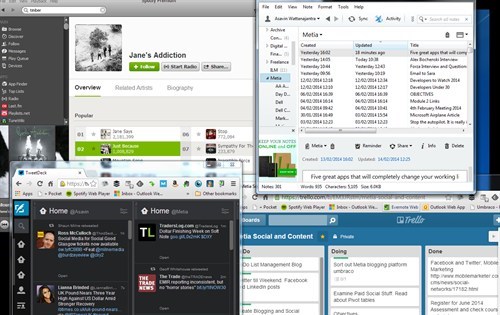Five great apps that will completely change your working life (it did mine!)
14 February 2014
In the past I was hopeless at organising my time. I was unable to plan and make sure that I spent the required amount of effort and energy on the tasks I needed to do. This meant my secondary school and university days consisted of stress, energy drinks and cigarettes, as I left tasks for the last minute and procrastinated on the things that weren't actually important.
I've learned to organise my time much better, and very rarely get into a last minute deadline type of situation. This can obviously be partly put down to age and experience, but there is one factor which is crucial to how I organise my time and work efficiently: technology.
Back in the late 90's and early 2000's, I wasn't given the best impression of computing at school or at home. I used it to type stuff, but that was basically it. In terms of organisation and study tools it consisted of pen, paper and a diary.
Today is completely different. Now I can get through the day without having to use pen and paper, because everything I do is online. I have some incredible web tools that make me much more effective in how I work and do things.
Here are five of the most important web tools I use during my working day I can't live without.
1. Evernote
I do a lot of writing, and this tool has been absolutely invaluable in organising the whole process. When copywriting, you often have to juggle different clients, research and do interviews, all at the same time. For me Evernote makes this simple.
For one thing, I know everything I write will be saved somewhere. I also know that I will be able to find it pretty easily through the app's search functionality and use of tags and folders. And because it's held in the cloud I can access my work from anywhere, no hassle.
Evernote isn't the only tool that does this. There's also Office 365 and Google Apps which allow you to create content on the cloud and find it again. But it makes my life so much easier to know that everything I ever create through words, I'll have a record of.
2. Trello
This is a relatively new tool to me, but I've found it incredibly useful in some of the content marketing work I've been doing. It's free project management software that allows you to organise a team of people through a method called Kanban. It uses a system of boards, lists and cards of which you can assign people and tasks.
Again there are a number of project management tools which do a similar thing, but I'm particularly fond of the visual way information is displayed which makes it more intuitive to use on a personal level than other tools which often go for a list-based approach. Importantly it works pretty well on all the browsers and devices I've used – crucial if you're going to get your team working on it.

3. Things
For my purposes, this is the perfect task management application. I'm a Mac boy, so I needed an effective and reliable app that was simple and seriously powerful at the same time. But the real reason I chose Things ahead of the plethora of To-do apps out there (including Wunderlist), was its cloud and syncing capabilities. It offers a service called Things Cloud which stores all my to-dos and updates them across all devices – more or less instantaneously.
It also offers functionality that allows you to arrange tasks in different sections. This is useful for instance; if you want to create separate lists for the things you need to do that day, things you need to over the week, and things related to specific projects. This can eliminate the age-old problem of having a long list of to-dos which keeps growing and where nothing ever gets done. The only real issue is that it only works on Apple devices – so I use Trello in the office.
4. Spotify
This seems a bit out of place I know, but bear with me. I find listening to music vital in getting productive, tuning out the outside noise so I can concentrate. However, sometimes my brain needs different types of music to work at its full potential. With Spotify, you have almost an unlimited music library, with any playlists created saved on all your devices.
This means I can pick music depending on my mood. Need a bit of rock to get going - easy. Need a bit of classical to get my creative mind in gear – great! I also suffer from tinnitus – it’s even possible to get a bit of relief for this thanks to the white noise playlists available. Again, couldn't do without it.
5. Tweetdeck
With content writing, marketing and strategy you need to have a good grasp of social media and a tool that makes using it a breeze. For me this is Tweetdeck, which I have possibly been using ever since I first started up on Twitter. On PC and Mac I use it regularly (though on mobile the official Twitter app works just as well – which makes sense as Twitter bought out Tweetdeck a while ago).
I have a number of feeds (including mine, Metia's as I run it, and lists I've created which flag up important accounts and tweets). I can see all this at a glance, so I rarely miss anything. I can also post from different accounts without having to login and logout – absolutely crucial because if I had to undergo that process every time I posted I would go crazy.

